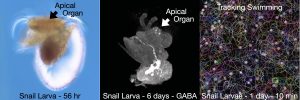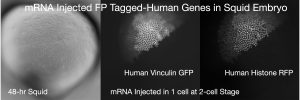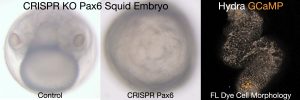FHL 548 | Summer B 2024
Functional Biodiversity: Exploring Origins of the Brain in Marine Invertebrate Larvae
In this novel course, students will explore marine invertebrate biodiversity using genetic tools to investigate biological functions and their underlying mechanisms within a phylogenetic framework. The course will examine systems and behavior in local species and their larvae, with a scope ranging from molecular and cellular processes to ecological and conservation perspectives.
We will collect organisms representing diverse phyla and use genetic tools on those samples to identify functional roles of components, cell-types, and circuits. Students will learn field, lab, and computational methods and apply those methods to a research project.
The material is geared toward graduate and advanced undergraduate students.
If you currently work with genetic tools or with biodiversity – and are curious about the other – or if you want to gain training to work with both for the first time – this course is for you! Students with backgrounds in biology, bioinformatics, or other fields are welcome – the course is open to advanced undergraduates, graduate students, and researchers at UW and other institutes.
The first week will introduce local invertebrates from ctenophores to tunicates, and discuss collecting, spawning, and larval culturing. We will learn skills including behavioral analyses, experimental imaging rigs, computational tools for sequencing, and methods to get genetic tools into animals. The subsequent four weeks will each focus on a functional area of genetic tool use and its implementation in biodiversity.
Possible topics for research projects building off of larvae, circuits, and behavior include:
- “What was I thinking?” Origins of our brain in marine invertebrate larvae
- “Flow and Go”: Fluid dynamics and functional control of cilia-based swimming in larvae
- “Is it hot in here?” Impacts of climate change stressors on larval circuits and behavior


